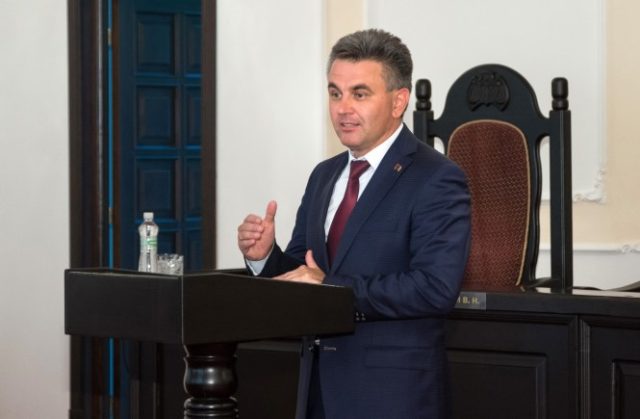
Transnistria: Change of Leadership, But Not Policy
Publication: Eurasia Daily Monitor Volume: 13 Issue: 198
By:

On December 11, Moldova’s secessionist region of Transnistria held presidential elections. After a heated campaign, mutual accusations and even prison threats, the Chairman of the Supreme Soviet (Transnistria’s parliament), Vadim Krasnoselski, defeated the incumbent President, Yevgeny Shevchuk, by a landslide (62 percent to 24 percent) in the first round (Dniester.ru, December 12). Krasnoselski will now control both the executive and the legislative branches. The Renewal party, which is the political arm of the Sheriff Company, holds 33 of the 43 seats in the Supreme Soviet. The Sheriff conglomerate is Transnistria’s wealthiest and most powerful business group—the largest employer and taxpayer in the separatist region (Rise.md, June 30).
Shevchuk’s reliance on administrative resources and partial control over the state bureaucracy and law enforcement have proved insufficient, perhaps because the judiciary and the local electoral commission are heavily influenced by the legislative majority, controlled by the Sheriff Company via its representative Krasnoselski. Yet, more importantly, it was Russia that intervened on several occasions to calm the spirits of the two opposing sides, thus ensuring a peaceful transition of power in the region that is de facto under its protectorate. The Kremlin did not openly support any candidate (Kommersant.ru, October 10). Instead, Shevchuk appeared to have better ties with the Russian government, including with the Russian Deputy Prime Minister and Kremlin’s envoy for the Transnistrian conflict, Dmitry Rogozin, while Krasnoselski had the backing of the ruling United Russia Party (Adevarul.ro, December 9).
The president, elected for a five-year term, is a central figure in the Transnistrian power structure and holds extensive executive powers, controlling the government and law enforcement forces. Unlike Shevchuk, who had strong opposition, Krasnoselski will have complete control over the self-proclaimed Transnistrian Republic. This presents some risks as well as opportunities for Moldova in the conflict settlement negotiations. Krasnoselski will enjoy a strong bargaining position, particularly as Moldova’s political system is highly polarized and a relatively strong opposition vocally objects to both the newly elected President Igor Dodon and the actual power broker in Moldova—Vlad Plahotniuc. Chisinau will find it difficult to reach consensus on a potential settlement proposal, despite the efforts by the OSCE to give new impetus to the negotiation talks (Moldnova.md, October 11).
Moldova’s President-elect Igor Dodon, despite having extremely limited prerogatives on setting domestic and foreign policy, proposed during the campaign a federal solution to the quarter-century-long frozen conflict. However, not only was his proposal rejected by Krasnoselski and Shevchuk (Radiochisinau.md, November 19), something to be expected during an election campaign in Transnistria, but it was also rebuked by the Moldovan center-right opposition as well as the ruling Democratic Party (Agora.md, November 19). Still, no solution to the conflict will ever materialize without Kremlin’s approval. Moscow’s influence was clearly manifested as Dmitry Rogozin personally intervened during the campaign to avoid further escalation of political tensions between the two opposing camps (Newsmaker.md, October 11). Furthermore, after the election results were announced, Shevchuk was summoned to Moscow to ensure a peaceful transition of power (Vestipmr.info, December 13).
Nonetheless, holding the political and economic power in the breakaway region, Krasnoselski and the two pragmatic and non-ideological businessmen behind Sheriff—Victor Gusan and Ilya Kazmali—could potentially become sensible partners in the reintegration talks with Chisinau (Politrussia.com, November 12; Rise.md, December 12). It is noteworthy that, in the first nine months of 2016, Transnistria exported 57 percent of its products to the European Union (benefiting from Moldova’s free trade agreement with the EU) and only 38 percent to the Russia-driven Eurasian Economic Union (Realitatea.md, September 18), which makes the region and its business elite increasingly westward-looking. The Association Agreement between the European Union and Moldova signed in 2014 and enacted fully in July 2016, particularly its economic component, the Deep and Comprehensive Free Trade Area, to which Transnistria also signed on, albeit with some caveats, makes the region increasingly dependent on the EU market. This, along with decreasing Russian assistance, which only exacerbates the already dire economic conditions in the region, could prompt the new Transnistrian leadership to become more lenient toward a mutually feasible settlement. Still, this remains a long-term prospect. In the short run, the region will continue to get on the Russian bandwagon.
Russian Foreign Minister Serghei Lavrov stated during the OSCE ministerial meeting in Hamburg that Russia counts on further progress in the settlement negotiations over Transnistria (RIA.ru, December 9). However, all stakeholders in the conflict have long become accustomed to Russian diplomatic formalism and have very low expectations in this regard. Until Russia fulfills its 1999 OSCE Summit commitments to withdraw its military forces and equipment from Transnistria, Moscow will have little credibility when it declares support for the sovereignty and territorial integrity of Moldova. This becomes all the more evident as Moscow rejected yet again Ukraine’s offer to provide a corridor for the withdrawal of Russian troops from Transnistria. Russian Deputy Foreign Minister Grigory Karasin responded that the Russian peacekeepers would stay in Transnistria for as long as they are necessary for the preservation of peace (TASS.ru, November 11). Russian Deputy Prime Minister Dmitry Rogozin was even less diplomatic, ridiculing the proposal altogether (TASS.ru, November 7). Thus, the only feasible approach to conflict settlement in the foreseeable future is supporting Transnistria’s further integration into the EU market, and encouraging local grassroots confidence-building initiatives. Hence, the status quo is here to stay.



